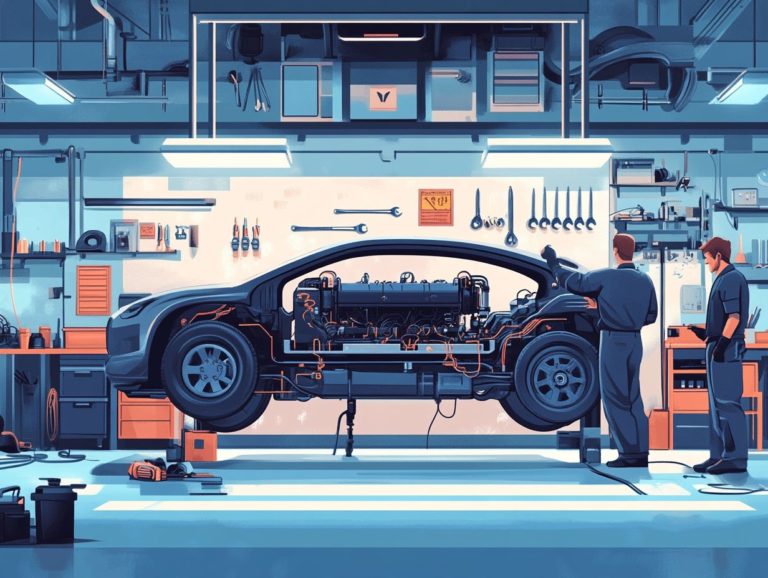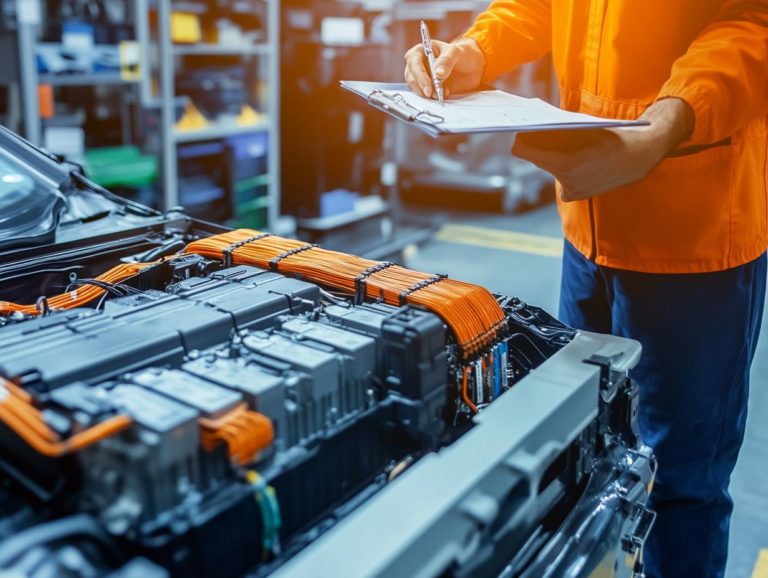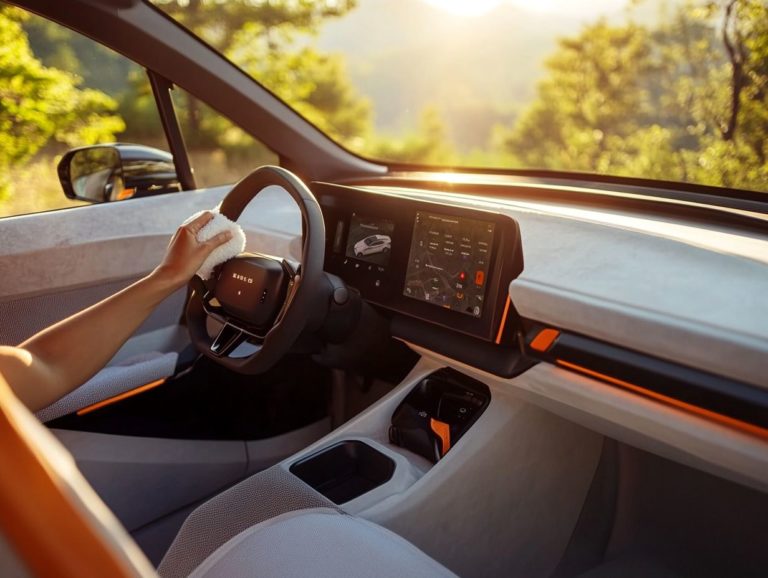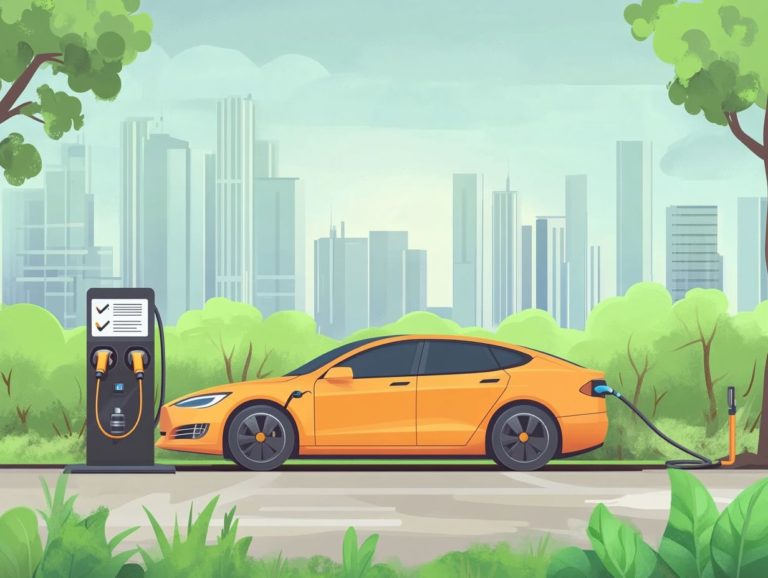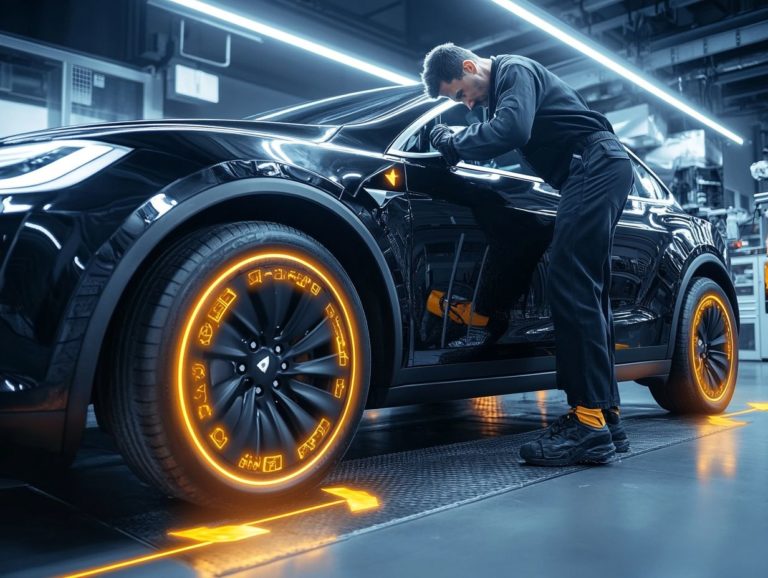The Importance of Air Filters in EVs
Air filters are essential to the performance and longevity of electric vehicles (EVs). While you might be preoccupied with battery life and charging infrastructure, the importance of clean air filters often slips under the radar.
This article delves into what air filters are, their vital functions in EVs, and the different types available. You ll learn about maintenance practices, the benefits of regular replacements, and we ll clarify some common misconceptions along the way.
Discover with us the often-overlooked significance of air filters in ensuring your EV operates at its best.
Contents
Key Takeaways:
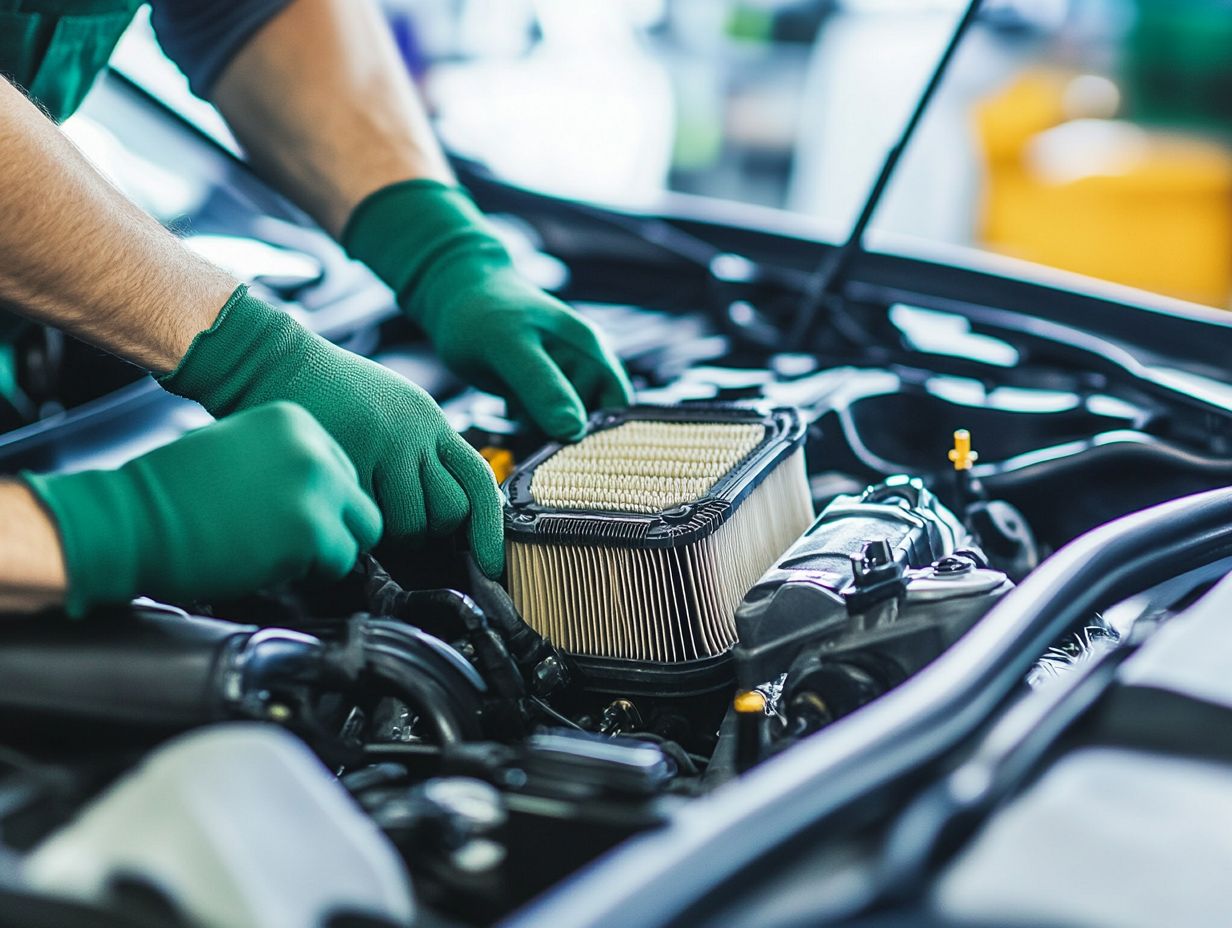
- Air filters are essential components in EVs that help improve performance and efficiency by keeping the air clean and free from harmful particles.
- Regular maintenance and replacement of air filters is crucial for the optimal functioning of EVs and should be done according to the manufacturer’s recommendations.
- There are various types of air filters used in EVs, and knowing the differences between them can help you choose the best one for your vehicle.
What are Air Filters and How Do They Work?
Air filters are essential components in various systems, including heating, ventilation, and air conditioning (HVAC) systems. They enhance indoor air quality by capturing airborne particles and contaminants.
These filters utilize different filtration methods, such as HEPA (High-Efficiency Particulate Air) and activated carbon, each offering distinct advantages. HEPA filters are particularly impressive, capturing 99.97% of particles as small as 0.3 microns. This makes them exceptionally effective at trapping allergens like dust mites and pollen.
Activated carbon filters excel in their ability to capture odors and volatile organic compounds, making them critical in spaces where smell control is paramount, such as kitchens and laboratories.
The significance of these filtration methods goes beyond mere comfort; they play a vital role in alleviating respiratory issues, allergies, and other health concerns associated with poor air quality. By integrating various filtration technologies, you can create a cleaner, safer environment, whether at home, in the workplace, or while on the road in your electric vehicle.
The Role of Air Filters in EVs
In electric vehicles (EVs), air filters maintain a high standard of air quality within the cabin. They offer crucial health benefits to passengers while enhancing the vehicle’s environmental footprint.
By incorporating high-quality cabin air filters, you can effectively trap airborne particles like dust and pollutants that might otherwise diminish your driving experience and impact your well-being. This meticulous filtration process elevates comfort and aligns with sustainable practices by optimizing energy consumption and minimizing environmental effects.
Why Air Filters are Important for EVs
Air filters are absolutely essential in electric vehicles, ensuring the air quality in your cabin remains at its best. They significantly reduce airborne contaminants, enhancing overall health benefits for you and your passengers. By preventing harmful pollutants from entering your vehicle’s interior, these filters contribute to a cleaner environment and a more enjoyable driving experience.
With state-of-the-art features like molecular air filtration and activated carbon, modern cabin air filters tackle air quality issues head-on, ensuring your EV meets the highest standards for comfort and health.
These systems are especially crucial in urban environments, where dust, pollen, and other allergens abound. They improve efficiency by capturing finer particulates and address specific health concerns for those with respiratory conditions. By enhancing air quality within the cabin, these filters help reduce fatigue and promote alertness, making every drive safer and more pleasant.
Investing in high-quality air filters transforms your driving experience into a healthier and safer journey!
Types of Air Filters Used in EVs
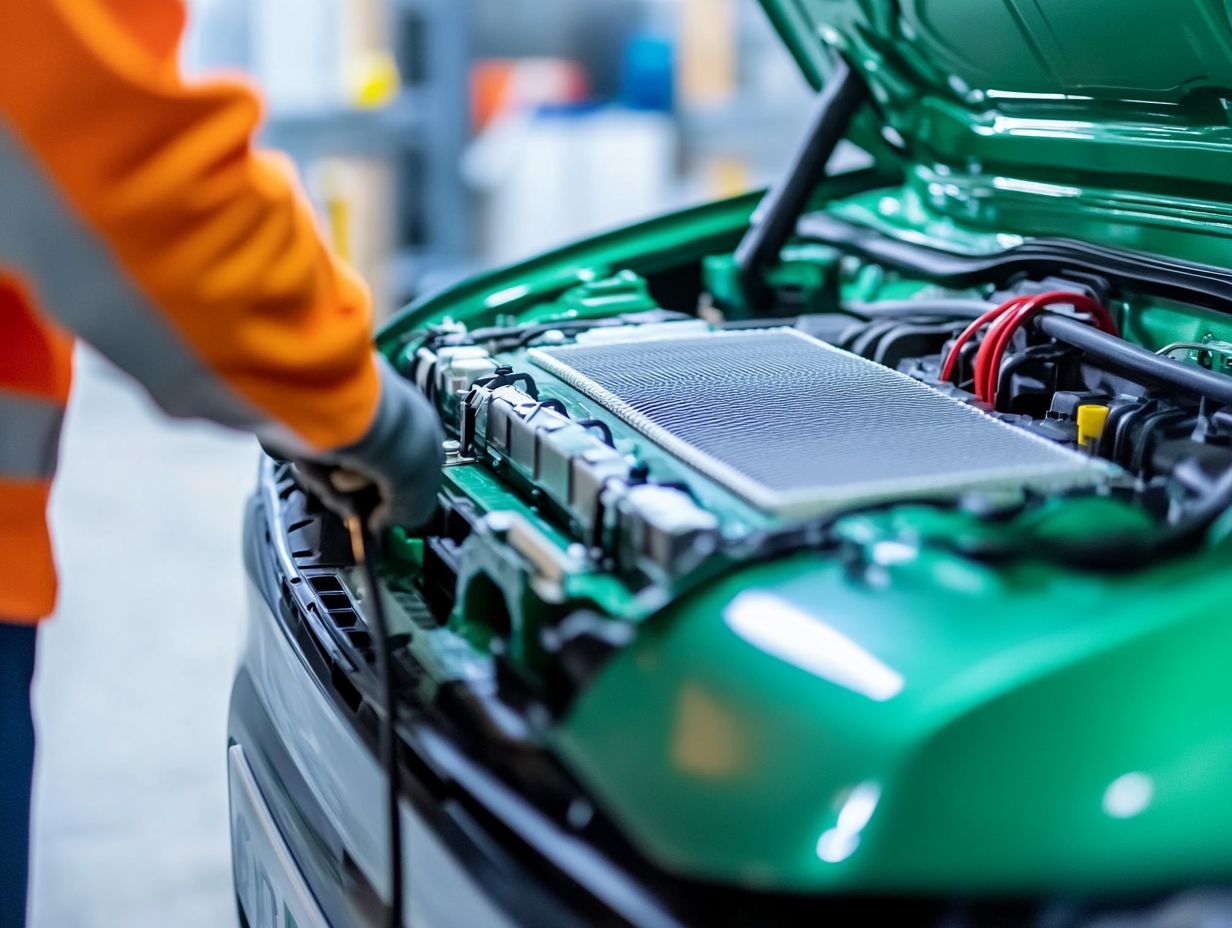
The electric vehicle industry employs a range of sophisticated air filters specifically crafted to enhance indoor air quality. Among these are HEPA filters, activated carbon filters, and specialized cabin air filters.
Each type of filter serves a distinct purpose. HEPA filters are renowned for their exceptional dust collection abilities, while activated carbon filters excel at eliminating odors and harmful gases, both critical for maintaining excellent air quality in electric vehicles.
HEPA filters can capture particles as tiny as 0.3 microns. This ensures that the cabin air remains clean and safe for you and your passengers.
Activated carbon filters work by adsorbing harmful chemicals often found in products like paints and cleaning supplies, making them critical for cultivating a healthy driving environment.
Beyond these two key types, you ll also encounter electrostatic filters, which use static electricity to snag airborne particles. These filters enhance overall filtration efficiency and can trap smaller particles that often slip past conventional methods.
Cabin air filters frequently combine different technologies to tackle various pollutants, ensuring robust protection against allergens, smoke, and other irritants.
By ensuring optimal air quality in electric vehicles, these filters enhance your comfort and promote better respiratory health. This transforms each journey into a significantly more pleasant experience.
Maintenance and Replacement of Air Filters in EVs
Regular maintenance and timely replacement of air filters in your electric vehicle are crucial for ensuring optimal air quality and maintaining the performance of heating, ventilation, and air conditioning systems. Neglecting filter upkeep can result in decreased efficiency and increased energy consumption.
By following the recommended replacement schedules, you can enhance air quality while enjoying significant cost savings over time. You ll also contribute to environmental sustainability in the automotive industry.
Best Practices for Keeping Air Filters Clean and Functional
To ensure your air filters in electric vehicles remain clean and functional, adopt several best practices. Regular checks and effective dust extraction techniques are essential for minimizing airborne pollutants within the cabin.
Maintaining your filters according to the manufacturer’s guidelines maximizes their efficiency and longevity. This ultimately supports cleaner air solutions for a healthier driving experience.
Choosing filters with advanced features can make maintenance easier and enhance air quality. Regularly inspecting your air filtration system is crucial, as it allows you to spot any wear or clogging that could compromise performance.
Change your filters every 12 months or as recommended based on driving conditions. Investing in filters with activated carbon or HEPA capabilities can significantly elevate the filtration process, capturing even the finest particles.
This attention to detail in maintaining air quality creates a more enjoyable ride while fostering a safer environment for all passengers. By implementing these strategies, you can optimize your electric vehicle’s air systems, ensuring a consistently clean atmosphere inside the cabin.
Don t wait! Check your air filters today for a healthier, more enjoyable ride!
Benefits of Regularly Replacing Air Filters in EVs
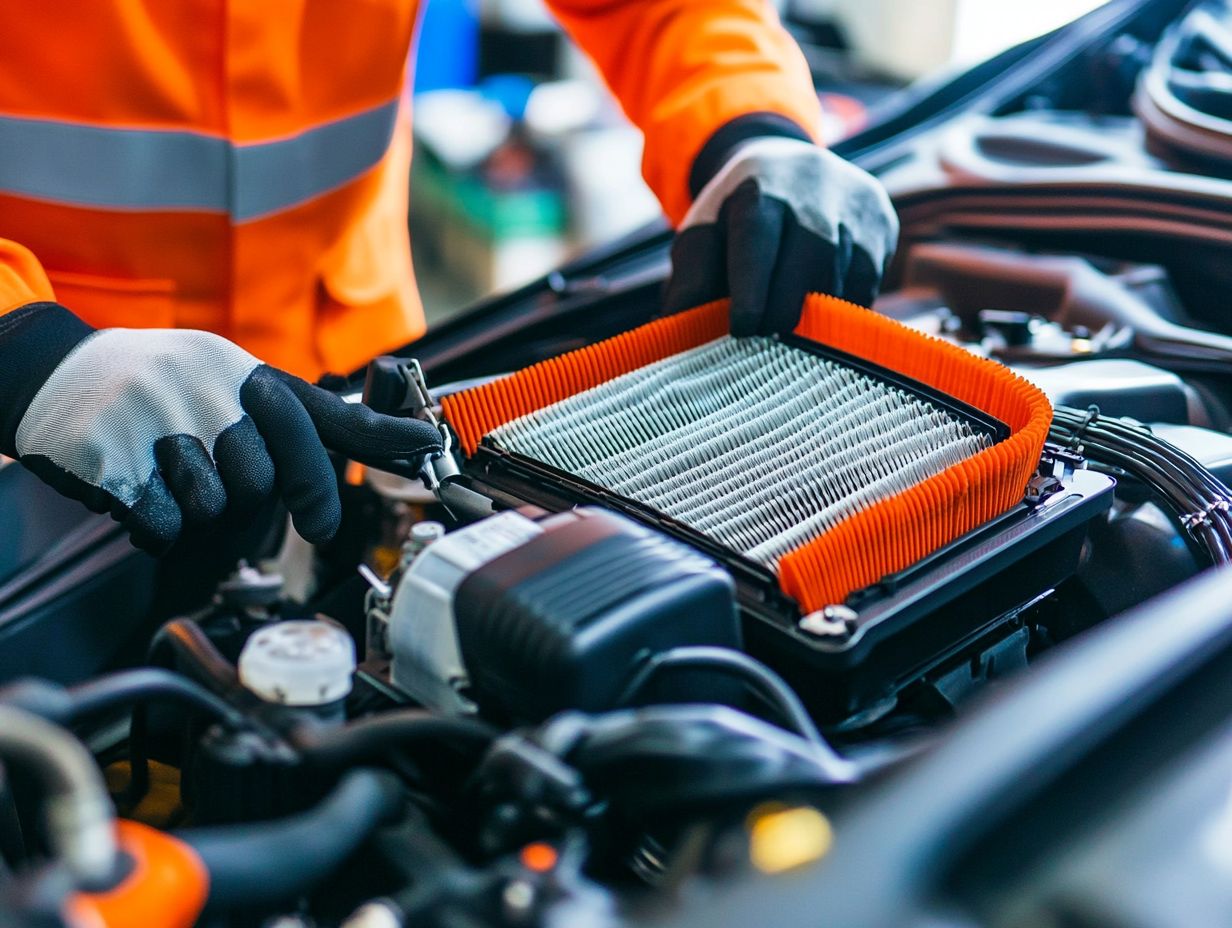
Regularly replacing air filters in electric vehicles offers a multitude of benefits that elevate your driving experience. You’ll notice improved performance of HVAC systems, reduced energy consumption, and enhanced air quality all of which significantly influence the health and comfort of everyone on board.
By keeping those filters free from dust and contaminants, you create a cleaner cabin environment! This allows for a more efficient drive. The health advantages of clean air are crucial, particularly in urban areas where air quality can be a concern. Prioritizing this simple maintenance step can transform your vehicle into a sanctuary of comfort and well-being.
Improved Performance and Efficiency
The performance and efficiency of electric vehicles are closely related to the condition of air filters. When your filters are clean, HVAC operations run smoothly, and energy consumption decreases.
High filter efficiency effectively captures contaminants and airborne pollutants, enhancing air quality and elevating your vehicle’s overall performance metrics.
In today s competitive car industry, manufacturers are honing in on advanced filter technologies to meet your rising expectations for superior air filtration and energy efficiency.
Neglecting your air filters can have serious consequences! Heightened energy consumption occurs as the vehicle’s systems struggle to function optimally. You may start to notice a decline in the responsiveness of your electric vehicle, attributed not only to powertrain inefficiencies but also to compromised air quality in the cabin.
Enhanced filter systems address these challenges, allowing for a smoother ride and extending battery life.
By prioritizing the cleanliness of your air filters, you can create a more comfortable cabin environment while also achieving better energy management throughout your journeys.
Common Misconceptions about Air Filters in EVs
You may have encountered several misconceptions about air filters in electric vehicles, especially regarding their maintenance and effectiveness in addressing air quality concerns. It’s easy to underestimate the importance of regular filter upkeep, thinking they can last indefinitely without needing replacement.
This is a misconception; filters can quickly become clogged with airborne particles. This not only diminishes their effectiveness but could also pose health risks for passengers. By grasping the realities of air filters, you can make more informed decisions and adopt better practices within the car industry.
Debunking Myths and Clarifying Facts
Debunking myths surrounding air filters in electric vehicles is crucial for fostering a clear understanding of their role in maintaining air quality and ensuring passenger health. For instance, you might hear the common misconception that all filters are created equal.
In reality, specific features, like High-Efficiency Particulate Air (HEPA) and activated carbon capabilities, vary significantly in their effectiveness against different airborne pollutants. By clarifying these facts, you can enable yourself to make informed decisions about filter maintenance and replacement.
Many people believe that a clogged air filter merely reduces performance, overlooking the more serious issue: it can also permit harmful contaminants to infiltrate the cabin. Another widespread misconception is that air filters require less frequent replacement in electric vehicles compared to traditional engines.
However, even electric models benefit from regular filter checks to ensure optimal air quality. Grasping the true capabilities of air filters not only elevates your driving experience but also protects your health by minimizing exposure to allergens, dust, and other harmful particles.
By addressing these myths, you can fully appreciate the vital role that air filters play in the overall maintenance of your electric vehicle.
Frequently Asked Questions
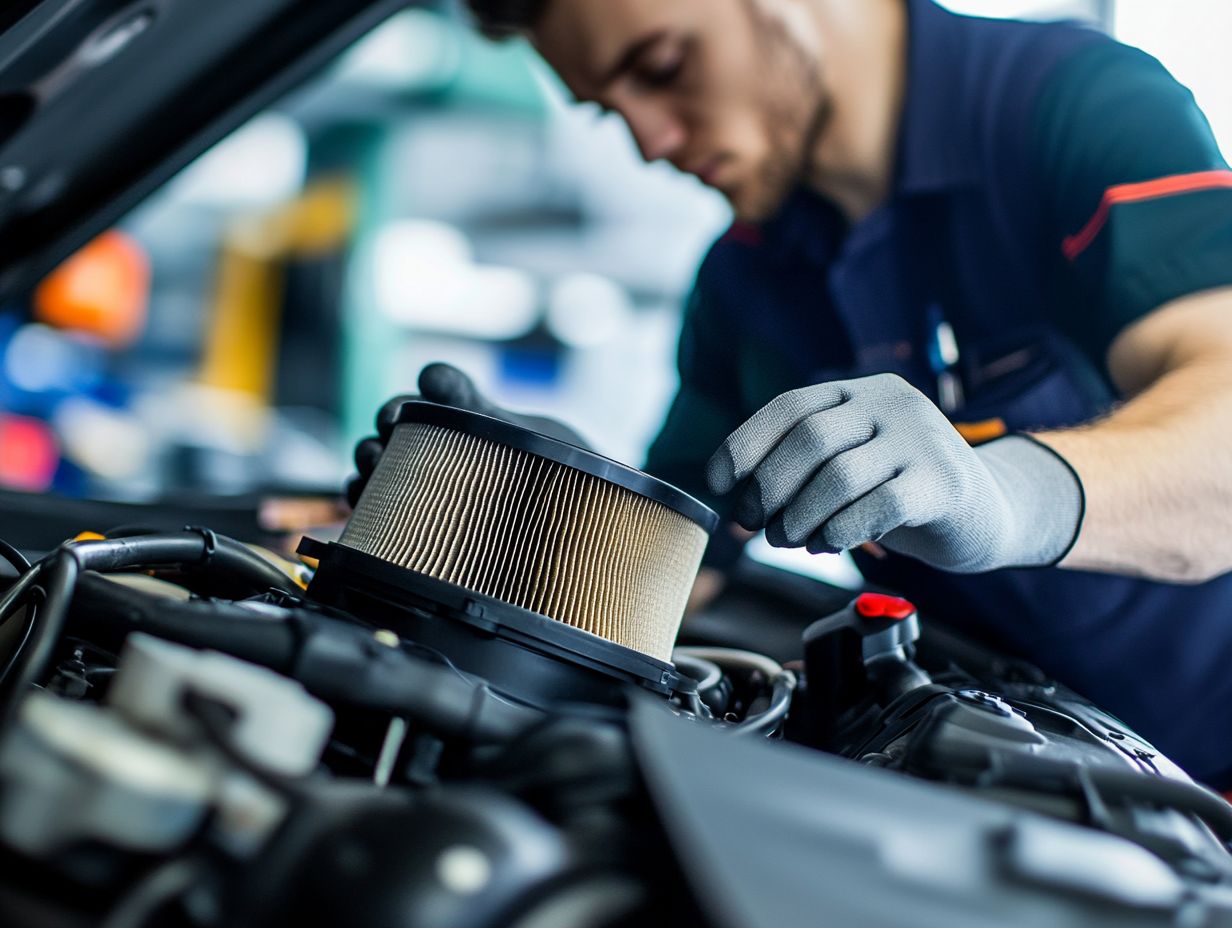
What are the signs that my air filter needs replacement?
Common signs include reduced airflow, unpleasant odors, and decreased HVAC efficiency. Don’t wait to check your filters!
How often should I replace my air filters?
It s generally recommended to check your filters every 6 months and replace them as needed.
Can I clean my air filter instead of replacing it?
While some filters can be cleaned, others need to be replaced. Always refer to your vehicle’s manual for specific guidelines.
Why are air filters important in EVs?
Air filters keep the air flowing into your car’s engine clean. This helps the engine run smoothly and last longer.
What types of air filters are used in EVs?
EVs typically use two types of air filters: cabin air filters and engine air filters.
Cabin air filters clean the air inside the car, while engine air filters filter the air entering the engine.
What happens if air filters are not regularly replaced in EVs?
Neglecting to replace air filters can lead to blockage by dirt.
This blocks airflow, which can reduce performance and efficiency, leading to costly repairs later.
How often should air filters be replaced in EVs?
Replace air filters every 15,000 to 30,000 miles.
Check your vehicle’s manual to stay informed!
Can I replace air filters in my EV on my own?
You can easily replace air filters as an EV owner.
Just make sure to use the right type and size to avoid any engine damage.
What are the benefits of regularly replacing air filters in EVs?
Regular replacement boosts engine performance and fuel efficiency.
It also reduces emissions and improves air quality inside the cabin.

